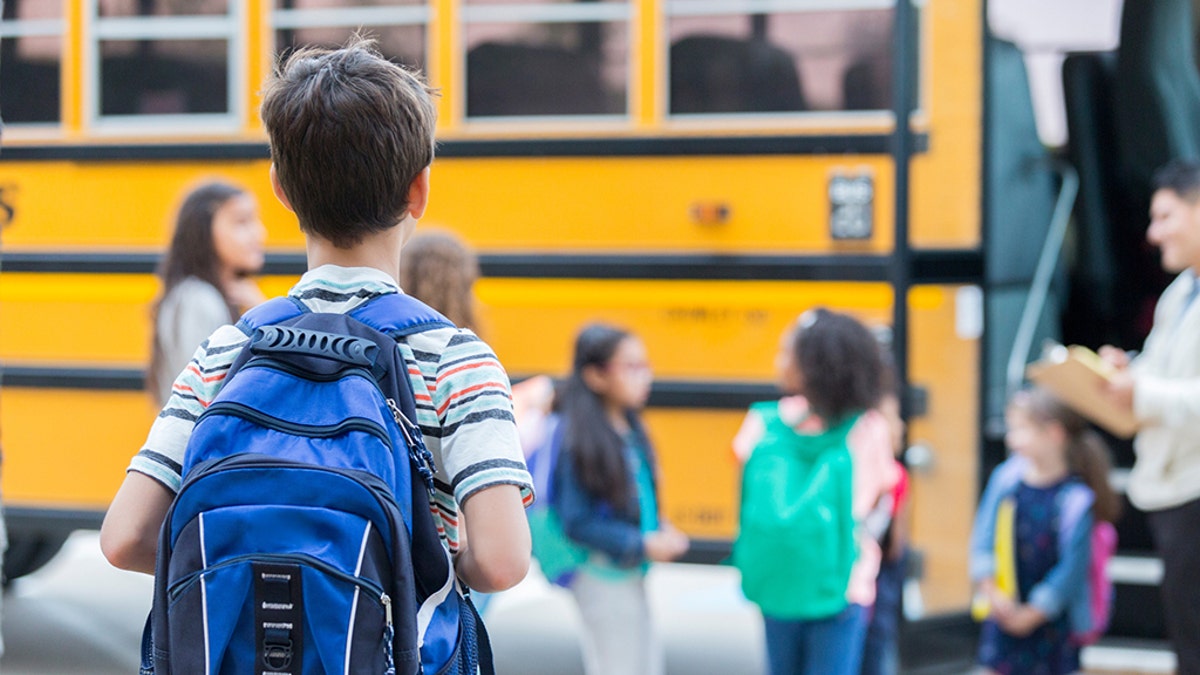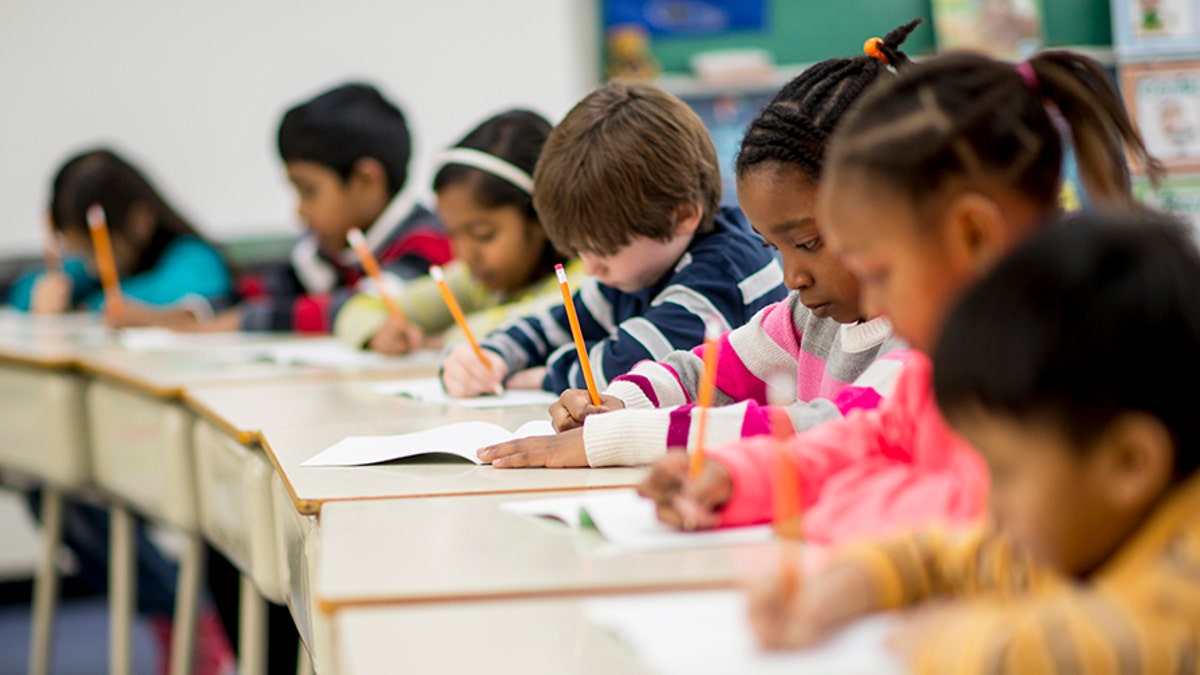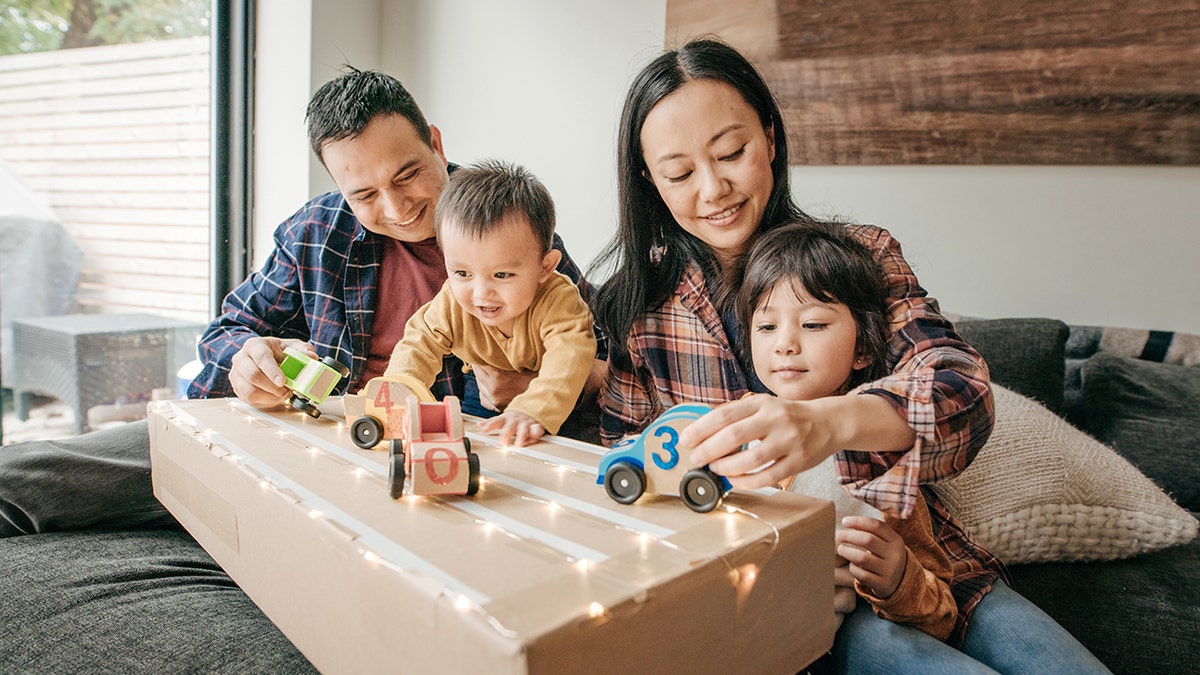Fox News Flash top headlines for September 21
Fox News Flash top headlines are here. Check out what's clicking on Foxnews.com.
If you're a parent of young ones in school, how do you say goodbye to your kids each day when they leave for school in the morning?
Do you squeeze out one more hug as they cross the threshold into their classrooms?
Do you beg for a kiss on the cheek in the car line?
Maybe you part ways with your crew at the carpool or bus stop.
BACK TO SCHOOL MENTAL HEALTH: HOW TO CHECK IN WITH YOUR KIDS BEFORE PUTTING THEM ON THE SCHOOL BUS
No matter what your morning drop-off looks like, it can sound powerful and be powerful with the words you choose to share with your children.
Parents’ relationships with schools have been strained in recent years, but parents are their children’s first — and best — teachers.

As parents send their kids off to school each morning, "American values need not be relegated to the history department," urges one mom. (iStock, File)
Try using these five encouraging phrases to help your children carry your hopes for them all day long, whether or not you get to enter the building with them.
American values need not be relegated to the history department.
They can, in little notes, be scribbled in lunch boxes, sketched out in messages in agenda books and whispered in the ears of our youngest citizens and our country’s future.
"American values need not be relegated to the history department."
What if we all changed "Have a great day, kids" to "E Pluribus Unum, kids"? (See no. 3!)
Try sharing these five tips with your kids (just as I, a mom of four, have done with mine). See what happens!
1. ‘Practice makes … better’
Perfection is an illusion, so the "practice makes perfect" phrase we all grew up with can be thrown out with the old blackboards.
When we start learning how to write, our penmanship gets better slowly, over time, with practice.

When children are first learning to write, their penmanship gets better slowly, over time — and parents can encourage them to keep practicing. (iStock)
No one really has perfect penmanship unless your name is "MacBook Pro."
So when our kids get frustrated that they didn't do the math problem right the first (or even the second or third time), we encourage them to keep practicing.
They won't get it perfect — but they will get it better.
2. ‘Learning is the goal (not making an A)'
America was built and sustained by brave people who were willing to try something new and learn.
They had an idea, they explored ideas and they iterated on those ideas.
Small business owners make up the bulk of our economy. Did you know most American entrepreneurs were C students?
"Schoolwork can become a more relaxed journey, rather than a pressure-cooked race to a destination."
It’s not because they weren't or aren’t as smart as the A student. They just learn differently and are motivated by different things. They do better building things and solving hands-on problems than they do taking pencil-and-paper tests.
When A and C students grow up, A students are typically afraid of failing and thus are more inclined to go work for someone else (most likely the C student) in a job that they are pretty confident will be there tomorrow — whereas a C student who was used to getting some questions right and some questions wrong isn’t afraid to take a risk.

Parents can help their children "learn to love learning for its own sake." (iStock)
"Failing" at a task or two isn't that big of a deal. Kids learn to just pick themselves up, dust themselves off and try all over again.
If your kids learn to love learning for its own sake — if they figure out a way to persist even when they get the answers wrong and if they develop an affection for the process, rather than the outcome — you just might see more As and Bs after all.
That's because schoolwork becomes a more relaxed journey, rather than a pressure-cooked race to a destination.
3. 'You are not alone — we're a team!'
E pluribus unum is Latin for "Out of many, one."
That's America's motto — and it can be your family's motto, too.
Americans are supposed to work together as a team, but that can only happen when families at home choose to function as a team.
SEN. MARSHA BLACKBURN'S BACK-TO-SCHOOL TIPS INCLUDE WARNINGS FOR PARENTS ABOUT ‘WOKE POLICIES’
(I tell my own kids, "Our family is a team. Huddle up, everyone, hands in the middle, all together now, '1, 2, 3, G-o-o-o-o-o Team R-i-i-i-i-i-ner!'").
Your children might feel lonely if they've just started at a new school.
Your children might think no one else understands how they're feeling.

Parents can try incorporating "we" words into their speech — words like "us," "team," "group" and "pack," says author Britt Riner. (iStock)
Or, if your kids are struggling with virtual school, they might feel like you can't relate, since you, their parents, never had to do that when you were little.
If they're back in brick-and-mortar school, they still might think you don't get it — "You never had to wear a mask all day long!"
Or they might be around teachers who insist on masking up for themselves.
"Let's scribble America's motto on a piece of paper, tape it on the bathroom mirror and write it on our hearts."
Some of this may be technically true for your kids, but it doesn't have to feel that way.
To help weave this into the fabric of your family, try incorporating "we" words into your speech — words like "us," "team," "group" and "pack."
WIFE OF FORMER GREEN BERET WRITES CHILDREN'S BOOK ABOUT BRAVERY, COURAGE AND COMPASSION
Let's scribble America's motto on a piece of paper, tape it on the bathroom mirror and write it on our hearts — maybe even turn it into a chant or a song, just as a baseball team would.
Yes, there's only one batter at a time — but the coach and teammates on the bench are just as much "in the game" as the player hoping to get on first base.
4. ‘You are the only you — the world needs you to be you!’
To help your children understand how special and unique they are, make thumbprints of them, yourself and your other family members.
No two fingerprints are the same!

Parents are their children's first teachers, and the words and phrases they use around their kids are incredibly important, including "You are the only you — and the world needs you to be you!" (iStock)
The biometrics industry is evidence of that.
While your kids might be too little to appreciate the retina scan, let’s show our children that we need their unique eyes and their unique hands on this world.
Same goes with our little ones. They are all an essential piece of our American puzzle.
Here's another activity to try with your kids: Take out a puzzle you enjoy working on together.
Put all of the pieces together except one.
RETRO BACK TO SCHOOL SUPPLIES: NOSTALGIC ITEMS THAT'LL MAKE YOU RELIVE THE GOOD OLD CLASSROOM DAYS
Is the picture complete? No!
You need the missing piece to get the full picture.
Same goes with our little ones. They are all an essential piece of our American puzzle.
5. ‘Look up!’
Invite your kids on a walk. A walk can help break up the day (plus research shows it’s good for the brain) if you school at home.
If your kids go to brick-and-mortar school, try inviting them on a walk when they return home. Once outside, take some steps (in a safe part) on the street.
CLICK HERE TO SIGN UP FOR OUR LIFESTYLE NEWSLETTER
What do they see? Maybe some cracks in the sidewalk, perhaps some dirt, maybe even a piece of gum stuck to the road.
When they look at those things, how does that make them feel?

Britt Riner is a mom of four based on Florida's west coast. Children "are an essential piece of our American puzzle," she says. (Britt Riner)
What do they see when they look up? Blue sky? Clouds? Tree branches? Houses? Birds flying?
When we hang our heads in despair, nothing good comes from that.
We see what’s dirty, what’s rough, what's chewed up and spit out.
CLICK HERE TO GET THE FOX NEWS APP
But if we choose to look up, our spirits are lifted, we can imagine — and we are encouraged.
"In God We Trust" is printed on our money.
Do we imprint it on our hearts?


